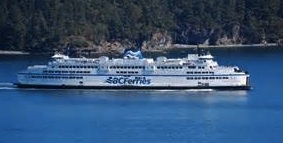The following is the text of a news release from British Columbia Ferry Services:
(VICTORIA, British Columbia) (Dec. 9) — BC Ferries announced today that the company has issued a Request for Proposals (RFP) to five pre-qualified shipyards, including one Canadian proponent, to build three intermediate class ferries to replace the 48-year-old Queen of Burnaby and the 49-year-old Queen of Nanaimo. Both of these vessels are nearing the end of their service lives and will be retired in 2016.
BC Ferries intends to build two vessels capable of carrying 145 vehicles and up to 600 passengers and crew to replace the Queen of Burnaby, which sails between Comox and Powell River, and to replace the Queen of Nanaimo, which services the Tsawwassen – Southern Gulf Islands route.
A third vessel capable of carrying 125 vehicles and up to 600 passengers and crew will also be built to augment peak and shoulder season service on the Southern Gulf Islands route, plus provide refit relief around the fleet.
Nine pre-qualified shipyards responded to a Request for Pre-Qualification. An RFP has now been issued to invite the following five pre-qualified shipyards to participate further in the procurement process to design and build the three intermediate class vessels:
• Fiskerstrand Blrt As – Norway
• Flensburger Schiffbau-Gesellschaft mbH & Co.KG – Germany
• Remontowa Shipbuilding S.A. – Poland
• Seaspan Vancouver Shipyards Co. Ltd. – Canada
• Sefine Shipyard – Turkey
“As we embark on this next phase of our newbuild program, these vessels will set a new standard of efficiency for the fleet,” said Mark Wilson, BC Ferries’ Vice President of Engineering. “Currently we operate 18 classes of vessels in a fleet of 35 ships. This project is the stepping stone to eventually bring the fleet into potentially five classes of vessels. Standardization of vessel classes will achieve cost savings by building ships with standardized equipment and systems, which will save maintenance and training costs, realize service flexibility across various route options, and interoperability between vessels.”
In the RFP, BC Ferries has stipulated that these three vessels be designed to operate as dual-fuel capable. Specifically, these ships will be able to operate on either Liquefied Natural Gas (LNG) or Marine Diesel Oil (MDO). BC Ferries is pursuing funding under incentive programs to help offset any incremental capital costs associated with the use of LNG.
“We expect to operate these new intermediate class ferries with LNG, which will reduce our fuel costs, and in turn help reduce the upward pressure on fares. In addition, we expect to reduce our environmental footprint with a cleaner fuel source,” said Wilson. “While other ferry operators have already adopted LNG as a fuel source, these will be the first ships in our fleet to utilize this natural resource which is abundant here in British Columbia.”
The RFP closes at the end of February 2014 and after a detailed evaluation of the proposals received, BC Ferries expects to award a contract to the successful bidder in the spring of 2014. The two-145 vehicle ferries are expected to enter service in 2016 and the 125-vehicle ferry is expected to be in service in 2017.
Benefits of LNG
• The price advantage of adopting LNG is highly favourable. In today’s market it is approximately 50 per cent better than MDO fuel.
• Last year, BC Ferries spent $121 million on fuel. Using LNG will reduce this expenditure.
• LNG’s market price is expected to remain stable over the medium term, with suppliers developing expanded supply outlets across Canada and North America.
• LNG is a “greener” and much cleaner fuel source with very favourable environmental gains compared to MDO. LNG use as a fuel results in substantial reductions of environmentally harmful products such as: greenhouse gases, oxides of Nitrogen and Sulphur, and airborne particulates.
• LNG adoption cuts carbon emissions by about 25 per cent, SOx (Sulphur Oxides) by almost 100 per cent and NOx (Nitrogen Oxides) by 85 per cent, which translates into much cleaner exhaust emissions than the diesel variant.
• Utilizing marine main propulsion and power generation engines that can utilize either MDO or LNG provides greater flexibility for operations and maintenance requirements.
• LNG will reduce costs over the life of the vessel and therefore help mitigate financial pressure for BC Ferries’ customers.
• LNG as a marine industry fuel is inherently safe and has been in service worldwide, including use in passenger ferries.
• Currently ferries worldwide have been safely operating on LNG for over 10 years with over a million operational hours.

